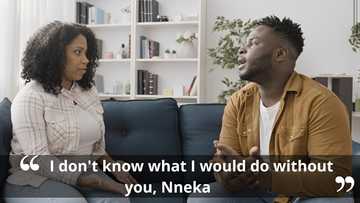I Spent Years Writing to My Sister: My Parents Never Sent a Single Letter
The box smelled like old dust and stale roof-room air, but beneath the lid, the scent was purely mine: the faint, sweet trace of rooibos-infused hand cream and the cheap blue ink of a pen. I remember the weight of it, not just the physical heft of the cardboard, but the crushing, suffocating weight of two years of betrayed trust.

Source: Getty Images
I was fifteen, crouched in the dusty corner of what was about to become my cousin's bedroom, and I had just uncovered the impossible.
It wasn't just a few letters. It was a stack, a monument to my own misplaced devotion. Hundreds of envelopes, all addressed in my looping, adolescent handwriting: "To: Boitumelo, From: Mpho." Every single one was sealed, pristine, and thick with the contents of a young girl's heart. My heart.
The stack was bound neatly with a dense, yellowed rubber band, tucked deep inside a shoebox marked, "Tax Records, 1998." A small, meticulous lie, hidden inside a larger, meticulous life.

Read also
I Borrowed Drip to Fake a Rich Rapper Image — I Finally Quit Flexing and Released One Honest EP

Source: Getty Images
DON'T MISS IT: Stay Away From Fake News With Our Short, Free Fact-Checking Course. Join And Get Certified!
I didn't need to open one to know what was inside. I could remember writing every single one. The silly ones about school crushes, the angry ones about my parents, the pleading ones asking why she wouldn't call.
I wrote them every Sunday, sometimes two or three times a week when a thought was too urgent to wait. They were my lifeline to the person who understood me best, and I'd spent 730 days, two whole years, believing that she was receiving them, reading them, and simply choosing not to write back.
The room tilted. My hands started to shake, scattering dust motes dancing in the single beam of light slicing through the roof-room window. It was the absolute, total, devastating proof of something I hadn't even realised I'd suspected: my sister hadn't abandoned me.

Source: Getty Images
Our parents had stolen her from me. They had manufactured the silence, orchestrated the distance, and used my own devotion as the tool to build a wall between us.
The knot of abandonment I'd carried in my gut for years, a resentment I directed entirely at Boitumelo, dissolved in a searing flood of guilt and white-hot rage. I stood up, the shoebox clasped against my chest, feeling less like their daughter and more like a detective who had just solved a two-year-old missing persons case.
I walked down the narrow roof-room stairs, my vision blurred, the confrontation already burning in my throat.
I was thirteen when Boitumelo left. She was seventeen, beautiful, and incandescently alive in a house that prized stillness and silence. She was the only person who saw me, who truly got the stifling, conservative atmosphere our parents cultivated, a strict, rigid faith that allowed for zero mistakes.

Source: Getty Images
Boitumelo, with her wild laugh and even wilder sense of independence, was always going to push back against that kind of control. The stakes were high, but I didn't realise it at the time.
I remember the quiet. One morning, Boitumelo's side of our shared room was empty. Not just clean, empty. The scent of her favourite marula oil was gone, her posters had been stripped from the wall, and the small dent in her pillow had been smoothed away. It looked like she'd never been there at all.
When I asked, my father used the kind of calm, measured voice he reserved for explaining theological concepts. "Your sister has gone to stay with your Aunt Lesedi in Cape Town. She needs a change of scenery and some time to herself."

Source: Getty Images
Aunt Lesedi, who lived across the country, and whom we hadn't seen since I was five. It felt plausible enough to my thirteen-year-old mind.
Boitumelo was rebellious; she wanted to leave, and a distant relative was a neat, clean explanation.
The real reason, the terrifying, unforgivable reason, I only learned much later.
Boitumelo was pregnant. Unwed.
In our parents' world, this wasn't just a mistake; it was a profound, public shame. They hadn't argued or screamed. They had issued an ultimatum, packed a small bag, and removed the evidence of their failure from our spotless, perfect home.
They kicked her out, my older sister, four months pregnant, alone in the world.

Source: Getty Images
To me, they crafted a careful and comforting narrative. "She'll be busy settling in, Mpho, but she misses you dearly," my mother told me, holding my hand. "Why don't you write her a letter? Tell her all about your Grade 8 year. We'll make sure it gets to her."
It wasn't encouragement; it was policy. It was a way to maintain the façade, to keep me compliant, and to give me a task that would prevent me from asking difficult questions about why she hadn't called.
I believed them implicitly. They were Mama and Baba. They were the ones who taught me right from wrong, honesty from sin. They would never lie about something so fundamental.
So, I wrote.
It became my ritual. Every week, I'd sit at the kitchen table after homework, pouring my teenage heart onto thin, lined paper. I needed her to know I was fine, that I was surviving without her, but also that I missed the specific, chaotic energy she brought to our silent house.

Source: UGC
She was my co-conspirator, my shield, and my mirror.
Losing her was like losing a vital limb, and those letters were my attempt to keep it connected, no matter the distance.
The stakes, I now understand, were my sense of reality. The letters weren't just correspondence; they were my desperate attempt to hold onto Boitumelo, and my parents' calculated effort to make me let go.
The initial lack of response was understandable. My parents were ready with reasons. "Oh, sweetie, she's just settling in. Give her a month or two. Starting a new life is hard," Mom would say, her smile tight around the edges.

Read also
My Landlord Bullied Tenants — Then a New Tenant Stopped Him Mid-Attack and Made Him Back Down
A month turned into six. Six months turned into a year. My letters grew thicker, heavier with unspoken questions and a growing, sharp edge of hurt. I transitioned from light updates to outright pleas.
"Boitumelo, why don't you ever call? A two-minute phone call is all I need. Are you mad at me? Did I do something?"

Source: Getty Images
Each week, I'd hand the sealed envelope to my father. He'd place it carefully in his inner jacket pocket before leaving for work, giving me a reassuring nod.
"Mailed," he'd confirm that evening, his tone authoritative and final.
But no letter ever came back. No Christmas card. No birthday wishes.
My fourteenth birthday passed with silence from Cape Town.
My father's excuses evolved. At the one-year mark: "She's enrolled in a difficult program, Mpho. Her job takes up most of her time. She's just busy. But she's reading them, I promise."
At the two-year mark, when I was fifteen and my confusion had curdled into palpable anger: "You have to understand, Boitumelo is a grown woman now. She has her own life, her own responsibilities. People drift apart, honey. It happens."

Read also
His Mother Humiliated Me During My Pregnancy — I Filed for Divorce and His Business Deals Dried Up

Source: Getty Images
I started to resent her deeply.
I felt stupid and rejected. Why was I wasting my energy on someone who couldn't spare five minutes to acknowledge my existence? It felt like the ultimate abandonment.
She'd always promised she'd protect me from our parents, and yet here I was, alone, writing letters into a void she refused to fill.
I started shortening the letters, writing only duty-bound, terse summaries of my week. The joy was gone, replaced by a sullen obligation.
One afternoon, I sat at the kitchen counter, meticulously wrapping a book I wanted to send her, a copy of her favourite novel. My mother watched me, her gaze troubled.
"Mpho," she said, her voice softer than usual. "Why don't you just send a card this time? She's probably not interested in fiction right now."

Source: Getty Images
I snapped. "Why does she always have an excuse? If she's too busy to pick up a phone, if she's too busy to write a single word, why am I still doing this?" I waved the book angrily. "I haven't heard from her in over two years! She left me here! Why can't she just..."
My mother cut me off, her hand slamming flat on the counter. The kindness in her eyes vanished, replaced by a cold, steely resolve I knew meant the end of the discussion.
"That is enough, Mpho. Your sister has made choices that are not in line with the family's values. If you choose to maintain contact, you will do so with respect and without complaint. Her choices are her cross to bear, not yours."
The phrase "her cross to bear" struck me with the force of a physical blow. It was the first hint of the dark truth, the first time they admitted that her leaving wasn't a choice she'd made to "get some time to herself." It was a punishment.

Source: Getty Images
Yet, even with that admission, I still blamed Boitumelo for whatever "bad choices" she'd made. I blamed her for prioritising her new life over me.
The resentment deepened, calcifying the lie the parents had so carefully constructed.
I tucked the book away, sealed the note, and handed it to my father that Sunday, hating the sister I thought had tossed me aside like an old doll.
It was two months after that heated exchange, two months after I had reluctantly started filling the letters with bitter, hollow sentiment, that the truth found me.
My cousin, Ayanda, was moving to town for college, and my parents, in a rare, frantic flurry of unplanned activity, decided to convert the small, unused roof-room storage area into a spare bedroom.

Source: Getty Images
I was tasked with clearing out the "junk."
That's when I found the shoebox tucked behind a stack of old youth fellowship lesson guides. "Tax Records, 1998."
My first instinct was to ignore it, but the tape holding the lid down was loose. I pulled it open, and the sight of the familiar rooibos-scented envelopes hit me with the force of a physical wave.
I didn't scream. I didn't cry. There was a moment of perfect, terrifying silence in the roof room as the two years of lies collapsed around me.
I grabbed the box and marched straight into the living room, where my parents were discussing paint swatches.
"What is this?" My voice was unnaturally flat, devoid of the high-pitched indignation I usually used for arguments. I held the box out, the contents spilling slightly over the top.

Source: Getty Images
My father's face, usually so composed, fractured for a fraction of a second. My mother gasped, a sound quickly swallowed by her hand.
"Mpho, put that down. That's private," my father said, standing up, his large frame suddenly intimidating.
"Private? These are my letters, Dad. To Boitumelo. All of them. Unopened, unmailed, right here," I whispered, the rage finally catching fire in my chest. "You told me you mailed them. Every single week for two years, you looked me in the eye and said she was reading them. You let me believe she hated me."
The excuses were instant, defensive, and desperate.
"We were protecting you, Mpho. She made a terrible mistake. She ran off; she was with a man we disapproved of. We couldn't let that sort of influence contaminate your young life. You needed to focus on your studies, on the Lord."

Source: Getty Images
"Protecting me?" I laughed, a hollow, broken sound. "You let me feel abandoned! You let me hate my own sister! Where is she? Tell me where Aunt Lesedi's house is, and I'll call her right now."
The final, brutal piece of the twist dropped then.
My mother stepped forward, her eyes wet but hardening with righteousness. "We don't know, Mpho. We have no idea where she is. When she left, we told her we would not contact her again until she repented. We haven't spoken to her since."
They had exiled her. They had cut the thread entirely. They didn't even know if she was safe, if she was alive, or if she'd had the baby.
They had erased her and then used my childish devotion to maintain their own lie.
Boitumelo hadn't abandoned me; they had abandoned us both.

Source: Getty Images
The ensuing weeks were a blur of cold silence and searching. I knew better than to ask my parents for anything; they wouldn't budge. My father just kept repeating the same mantra: "We did what was right for this family's spiritual health."
I had the name, Boitumelo, and a general idea of the city she was supposed to be in. The first place I looked, with my meagre fifteen-year-old internet skills, was social media.

Read also
I Refused His Advances So He Tried Public Humiliation — I Documented Everything and Restored My Role
It took me two days.
There she was. Not in Cape Town, but two provinces over. And she wasn't alone.
Her profile picture showed her, radiant and smiling, holding a toddler's hand—my niece.
I messaged her instantly, a frantic, half-coherent plea. I told her my name. I wrote: "I have the letters. All of them. They never sent them."
Her response came the next morning: a single word: "Call."

Source: Getty Images
The first meeting was terrifying. I took a minibus taxi several towns away, carrying the heavy shoebox like a lead weight. Boitumelo looked older, with scars around her eyes, but the moment she saw me, the familiar light was back. She hugged me so tightly I couldn't breathe.
I shoved the box at her and started crying, confessing my guilt for believing the lies, for the two years I had spent resenting her.
She held the letters, tears tracking paths through the dust on the cardboard, and smiled sadly.

Read also
A Guest Filmed My Friend Dancing With My Husband — I Protected Our Marriage and Cleared Her Name
"I tried to write to you, Mpho. When I first left. But Mom had already changed her email, and I didn't know your new address. I figured they'd cut the tie."
She told me the truth: the pregnancy, the exile, the terrifying struggle on the streets until a small, kind church community several towns away took her in. She now had a steady job, a small apartment, and a beautiful, healthy daughter named Amahle.

Source: Getty Images
There was a quiet karma in that moment.
My parents, in their attempt to 'protect' me, had driven us together. They had lost all access to Boitumelo forever, while I had regained her.
My guilt for not being there still stings, but seeing her whole, stable, and happy, a genuine, honest happiness my childhood home never offered, was the most significant relief.
We had years of silence to bridge, but the communication was now open and honest, a boundary firmly set against the toxic control of the past.
The clearest lesson I learned from the shoebox of unmailed letters is this: control is never a guarantee of protection.
My parents thought they were shielding me from an uncomfortable truth by constructing a convenient, manageable lie.

Source: Getty Images
But in reality, they wounded me far more deeply with their deceit than the truth ever could have. They stole my sense of reality, made me feel abandoned by the one person I needed, and poisoned the love between siblings.
Proper protection comes from honesty, however painful it may be. It comes from trust and the courage to face brutal realities together. You cannot build a foundation on a stack of unsent words.
If you believe you are doing something "for the good of your loved one," but it requires you to lie, what are you truly protecting: their heart, or your own reputation?
This story is inspired by the real experiences of our readers. We believe that every story carries a lesson that can bring light to others. To protect everyone's privacy, our editors may change names, locations, and certain details while keeping the heart of the story true. Images are for illustration only. If you'd like to share your own experience, please contact us via email.
PAY ATTENTION: Follow Briefly News on Twitter and never miss the hottest topics! Find us at @brieflyza!
Source: YEN.com.gh









